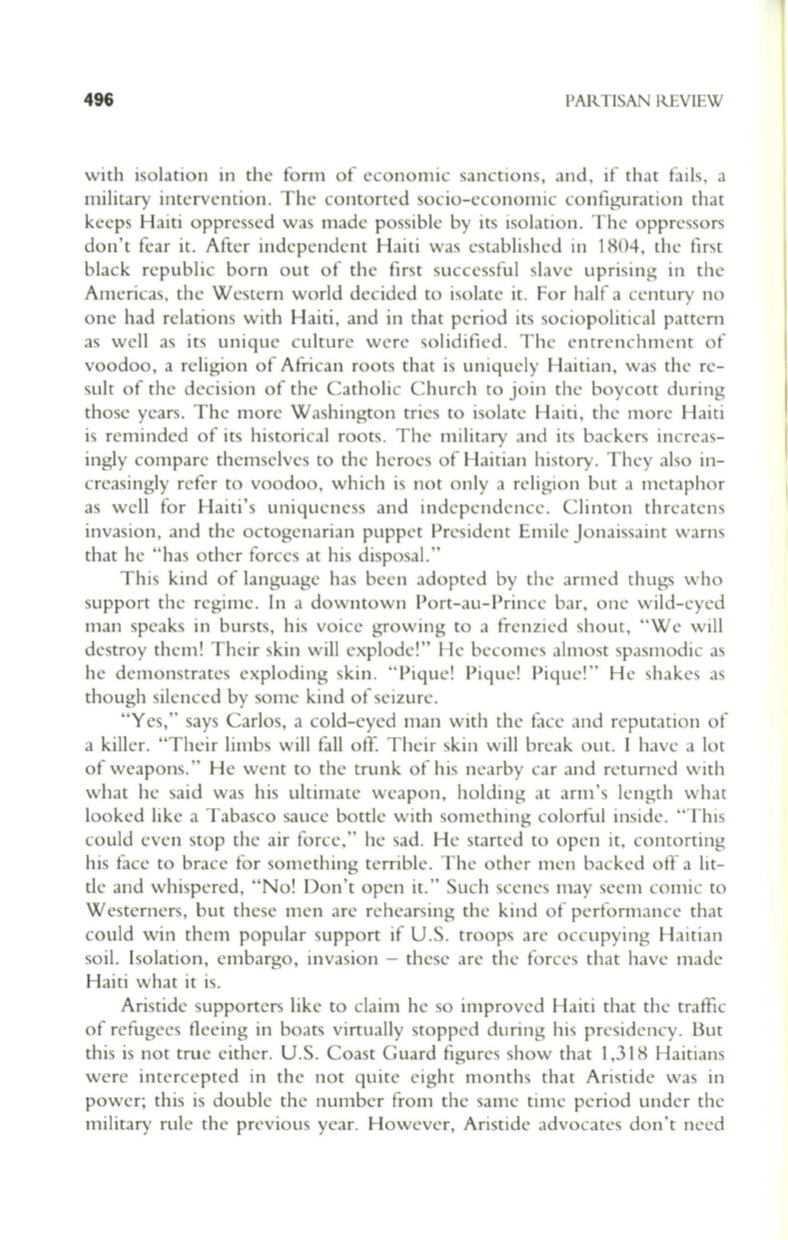
496
PAR.TISAN REVIEW
with isolation in the form of economic sanctions, and, if that fails, a
military intervention. The contorted socio-economic configuration that
keeps Haiti oppressed was made possible by its isolation. The oppressors
don't fear it. After independent Haiti was established in 1804, the first
black republic born out of the first successful slave uprising in the
Americas, the Western world decided to isolate it. For half a century no
one had relations with Haiti, and in that period its sociopolitical pattern
as well as its unique culture were solidified. The entrenchment of
voodoo, a religion of African roots that is uniquely Haitian, was the re–
sult of the decision of the Catholic Church to join the boycott during
those years. The more Washington tries to isolate Haiti, the more Haiti
is reminded of its historical roots. The military and its backers increas–
ingly compare themselves to the heroes of Haitian history. They also in–
creasingly refer to voodoo, which is not only a religion but a metaphor
as well for Haiti's uniqueness and independence. Clinton threatens
invasion, and the octogenarian puppet President Emile Jonaissaint warns
that he "has other forces at his disposal."
This kind of language has been adopted by the armed thugs who
support the regime.
In
a downtown Port-au-Prince bar, one wild-eyed
man speaks in bursts, his voice growing to a frenzied shout, "We will
destroy them! Their skin will explode!" He becomes almost spasmodic as
he demonstrates exploding skin. "Pique! Pique! Pique!" He shakes as
though silenced by some kind of seizure.
"Yes," says Carlos, a cold-eyed man with the face and reputation of
a killer. "Their limbs will fall off. Their skin will break out. I have a lot
of weapons." He went to the trunk of his nearby car and returned with
what he said was his ultimate weapon, holding at arm's length what
looked like a Tabasco sauce bottle with something colorful inside. "This
could even stop the air force," he sad. He started to open it, contorting
his face to brace for something terrible . The other men backed off a lit–
tle and whispered, "No! Don't open it." Such scenes may seem comic to
Westerners, but these men are rehearsing the kind of performance that
could win them popular support if U.S. troops are occupying Haitian
soil. Isolation, embargo, invasion - these are the forces that have made
Haiti what it is.
Aristide supporters like to claim he so improved Haiti that the traffic
of refugees fleeing in boats virtually stopped during his presidency. But
this is not true either. U.S. Coast Guard figures show that 1,318 Haitians
were intercepted in the not quite eight months that Aristide was in
power; this is double the number from the same time period under the
military rule the previous year. However, Aristide advocates don't need


